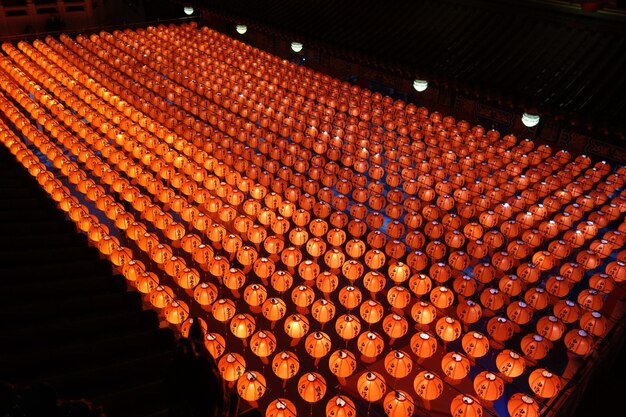How to Score Last-Minute Tickets to Sold-Out Concerts: Insider Tips for 2025

Securing last-minute tickets to sold-out concerts in 2025 requires a strategic, multi-faceted approach, leveraging technology, understanding market dynamics, and knowing when and where to look for opportune re-release and resale windows to ensure fans don’t miss out on their favorite live music experiences.
Ever found yourself staring at a “Sold Out” sign, heart sinking at the thought of missing your favorite artist live? It’s a common frustration, but in 2025, a sold-out concert doesn’t always mean the end of the road. With the right strategies and a bit of persistence, you can still learn how to score last-minute tickets to sold-out concerts: insider tips for 2025. This guide dives deep into the tactics and tools that can turn your concert dreams into reality, even when all hope seems lost.
Understanding the Market: Why Tickets Sell Out So Fast
The concert ticket market operates on a blend of demand, technology, and sheer fan enthusiasm. Understanding these underlying mechanisms is crucial for anyone hoping to snag coveted tickets, particularly for sold-out events. It’s not just about luck; it’s about knowing the ecosystem.
Today’s ticketing landscape is a complex web, influenced by a confluence of factors, from artist popularity to sophisticated resale markets. The initial rush for tickets often leaves many fans empty-handed, but this initial sell-out isn’t always the full story. Secondary markets, fan-to-fan exchanges, and even venues themselves can become sources for tickets in the eleventh hour.
The Role of Presales and Fan Clubs
One of the primary reasons tickets vanish so quickly is the prevalence of presales. These exclusive windows allow fan club members, credit card holders, or those with special codes to purchase tickets before the general public. While excellent for loyal fans, they significantly reduce the inventory available later.
- Early Access: Presales often account for a substantial portion of total ticket allocation.
- Fan Loyalty Programs: Joining official fan clubs or artist mailing lists is key for presale codes.
- Credit Card Perks: Many major credit card companies offer exclusive presale access to cardholders.
By the time tickets go on general sale, a significant percentage may already be gone, creating the illusion of an instant sell-out. This early access mechanism rewards dedicated followers but can be a barrier for others.
Bot Activity and Scalping
A persistent challenge in the modern ticketing era is the presence of bots and professional scalpers. These entities use automated software to buy large quantities of tickets the moment they become available, intending to resell them at inflated prices. This practice distorts the market and makes it considerably harder for genuine fans to secure tickets at face value.
Regulators and ticketing platforms are constantly battling this issue, but it remains a significant factor in rapid sell-outs. While efforts are being made to curb bot activity, it’s an ongoing cat-and-mouse game that impacts availability.
Dynamic Pricing and Fan Demand
Dynamic pricing, similar to airline ticket pricing, adjusts ticket costs based on real-time demand. High-demand concerts will see prices rise rapidly, sometimes even before general sale. This can lead to an initial shock for fans, but it also means that, in some cases, prices might fluctuate, potentially offering opportunities closer to the event.
The sheer volume of fans vying for tickets to a popular artist creates intense competition. When millions of people are trying to buy a limited number of seats simultaneously, a sell-out is almost inevitable, regardless of other factors. Understanding this intense demand helps frame realistic expectations for last-minute searches.
In essence, the “sold-out” status is a culmination of strategic pre-sales, the impact of automated purchasing, market-driven pricing adjustments, and overwhelming fan demand. Recognizing these elements is the first step toward devising a successful last-minute ticket acquisition strategy.
Leveraging Official Resale Platforms and Fan Exchanges
In the past, securing tickets to a sold-out show often meant resorting to shady back-alley deals or exorbitant prices on unregulated sites. However, 2025 brings a more structured and reliable landscape, particularly through official resale platforms and fan exchanges. These avenues are increasingly becoming the go-to for ethical and often reasonably priced last-minute tickets, providing a crucial alternative to primary sales.
The shift towards authorized secondary markets has been a game-changer. Venues and artists are now partnering with or endorsing platforms that facilitate safe and fair resales, combating the predatory practices of illegal scalping. This creates a transparent environment where fans can buy and sell tickets without fear of counterfeits or outrageous markups.
Ticketmaster Fan-to-Fan Resale
Ticketmaster, a dominant player in the primary ticketing market, has significantly expanded its fan-to-fan resale program. For many events, it’s the safest bet for finding legitimate resale tickets. When fans can no longer attend, they can list their tickets for sale directly through their Ticketmaster account, often at or below face value, and sometimes with price caps to prevent extreme markups.
- Verified Tickets Only: Ensures authenticity and eliminates the risk of fraud.
- Price Caps: Many events on Ticketmaster’s resale platform have price caps, preventing excessive pricing.
- Integrated System: Seamless transfer of tickets directly to the buyer’s account.
Checking Ticketmaster’s resale section regularly is paramount, especially in the days and hours leading up to the concert. Tickets often become available as plans change, or as venues release additional inventory closer to the show date.
SeatGeek and StubHub: Trusted Marketplaces
While not always “official” fan exchanges in the same vein as Ticketmaster’s direct resale, platforms like SeatGeek and StubHub are highly reputable secondary marketplaces that offer buyer guarantees. They are essential resources for last-minute tickets, even if prices can sometimes exceed face value due to market demand. Their robust buyer protection policies provide peace of mind.
These sites aggregate tickets from various sellers, offering a wide selection and often competitive pricing. The key is to compare prices across platforms and set alerts for your desired event. While you might pay a premium, the reliability and assurance of a valid ticket are often worth the extra cost for a sold-out event.
CashorTrade: The Face-Value Marketplace
For those committed to paying face value, CashorTrade is a unique and invaluable platform. It’s a fan-to-fan exchange specifically designed for buying and selling tickets at or below face value. It’s built on a community of concert-goers rather than profit-driven resellers.
Finding tickets on CashorTrade requires diligence and quick action, as desirable tickets vanish fast. However, it’s an excellent ethical alternative to typical secondary markets and aligns with the spirit of true fan exchange. Setting up alerts and being ready to act instantly when tickets pop up is crucial for success here. Many fans swear by its integrity and ability to connect true fans.

Venue and Artist Verified Resale Programs
Beyond the major platforms, many artists and venues are implementing their own verified resale programs. These are often linked directly from the artist’s or venue’s official website. These programs prioritize fan welfare by ensuring fair pricing and authentic tickets, directly countering the unregulated resale market.
Always check the official website of the artist or venue first for any specific resale initiatives. These direct channels often offer the most reliable and affordable last-minute options, especially as the event date approaches and unforeseen circumstances lead to ticket returns or re-releases.
By consistently monitoring these official and trusted resale avenues, fans significantly increase their chances of securing legitimate last-minute tickets to sold-out concerts in 2025, transforming what once seemed impossible into a tangible reality.
Timing is Everything: When to Look and Act
The adage “timing is everything” holds particularly true when it comes to securing last-minute tickets to sold-out concerts. It’s not just about knowing where to look, but precisely when to look and, more importantly, when to act. The market for last-minute tickets is highly dynamic, with availability fluctuating significantly in the days, hours, and even minutes leading up to a show.
Understanding these timed windows and being prepared to pounce can be the decisive factor between getting in and missing out. This involves anticipating a venue’s operational rhythm, a seller’s desperation, and the general ebb and flow of demand.
The Week of the Show: Price Fluctuations
As the concert date approaches, two primary scenarios tend to unfold on secondary markets:
Early Drop-Offs: A few days to a week before the event, some attendees confirm they can’t make it and list their tickets. Prices might still be high, but early opportunities exist.
Last-Minute Scramble: In the final 24-48 hours, prices can become highly volatile. Some sellers, desperate to recoup their costs, might drop prices significantly if their tickets haven’t sold. Conversely, for incredibly high-demand shows, prices might spike further as eager buyers make last-ditch efforts.
Monitoring price trends during this week is crucial. Tools that offer price history or alerts can be invaluable for identifying buying windows. Patience, combined with vigilance, can pay off during this period.
Day of Show: The Final Push
The day of the concert itself is often the most critical window for last-minute deals. This is when the most significant number of tickets become available due to various reasons:
- Venue Resale/Release: Venues sometimes release production holds, sound-board seats, or unseated tickets on the day of the show. These are typically at face value.
- Seller Desperation: Resellers who still hold tickets hours before the event are often willing to drastically reduce prices to avoid losing their entire investment.
- Refunds/Exchanges: Occasionally, individual tickets or small blocks might become available due to last-minute cancellations or exchanges processed by the venue.
At this point, constant refreshing of official ticketing sites and trusted resale platforms is essential. Be prepared to buy immediately, as these opportunities are fleeting. Setting up push notifications or alerts for specific events on apps can give you an edge.
The ‘Door Drop’ Strategy: At the Venue
For the truly dedicated, arriving at the venue an hour or two before the doors open can sometimes yield results. This strategy, often called “door dropping” or “box office lurking,” is about being physically present for last-minute releases:
- Box Office Releases: Venues may release a final batch of tickets, including production holds, right before doors open if they’re not needed.
- Fan-to-Fan Connections: While not sanctioned, sometimes people with extra tickets might be willing to sell them at face value to avoid waste. Exercise caution and meet inside a designated, secure area if possible.
This method isn’t guaranteed, but it provides a tangible, real-time chance. It’s especially effective for smaller venues or shows where online platforms might not reflect the absolute latest changes instantly.
Ultimately, last-minute success hinges on a combination of strategic monitoring, rapid response, and a willingness to act on fleeting opportunities. Being continuously engaged in the market during these critical windows is key to securing those elusive tickets.
Activating Alerts and Automation Tools
In the high-stakes game of securing last-minute tickets to sold-out concerts in 2025, relying solely on manual refreshing is a recipe for missed opportunities. The true advantage comes from leveraging technology: activating alerts and utilizing automation tools. These digital assistants can significantly increase your chances by notifying you the moment a ticket becomes available, often before the general public is even aware.
The speed at which tickets can appear and disappear on the secondary market necessitates instant notification. Whether it’s a price drop, a new listing, or a re-release from the venue, being among the first to know is paramount. These tools act as your digital eyes and ears, constantly scanning the market so you don’t have to.
Setting Up Price Drop and Availability Alerts
Most major ticketing and resale platforms offer some form of alert system. Taking advantage of these is the most straightforward and effective automation strategy:
- Ticketmaster/Live Nation: Sign up for text or email alerts for specific artists or events. They often notify users of additional ticket releases or official resale availability.
- Secondary Market Apps (StubHub, SeatGeek, Vivid Seats): Configure price drop alerts for your desired section or a specific price range. You’ll receive a notification when a ticket matching your criteria is listed.
- CashorTrade: Essential for face-value seekers, their alert system notifies you immediately when a ticket for your saved event is posted. Given the speed at which these tickets vanish, instant notification is critical.
The key is to customize these alerts to be as specific as possible regarding your preferred seating, price, and quantity. The more tailored your alert, the more relevant the notifications will be.
Aggregator Sites and Third-Party Tools
Beyond the native app alerts, several aggregator sites and third-party tools specialize in monitoring multiple ticket sources simultaneously. These can be particularly powerful for catching tickets missed by direct platform alerts:
- Seat Alerts / TicketIQ: Some sites specialize in aggregating ticket data and offer more advanced alert options, sometimes even predicting when tickets might become available based on historical data.
- Browser Extensions: Certain browser extensions can be configured to monitor specific web pages for changes and send notifications. While more technical, this can be useful for niche releases.
When using third-party tools, always ensure they are reputable and respect your privacy. Research reviews and user feedback before providing any personal information or linking accounts.

Social Media Monitoring with Keyword Alerts
Social media, especially platforms like Twitter and Reddit, can be surprisingly effective for real-time ticket information. Fans often share updates, news of releases, or even offer tickets directly. Setting up keyword alerts can give you an edge:
- Twitter Advanced Search/Alerts: Monitor hashtags related to the concert (#ArtistNameTickets, #VenueName, #ConcertTickets) for real-time posts. Tools like TweetDeck allow for persistent keyword columns.
- Reddit Subreddits: Join subreddits dedicated to specific artists, genres, or local concert scenes (e.g., r/Concerts, r/YourCityConcerts). Set up Reddit alerts for new posts containing relevant keywords.
While often less formal, social media can provide signals about unexpected ticket drops or fan-to-fan sales that haven’t hit official channels yet. Always exercise extreme caution when dealing directly with individuals on social media to avoid scams.
By combining native app alerts with the intelligence from aggregator tools and social media monitoring, you create a robust, multi-layered system that significantly improves your chances of being notified the instant those coveted last-minute tickets become available, ensuring you’re ready to strike.
Networking and Community Engagement
Beyond the digital battlefield of ticketing apps and automated alerts, an often-underestimated pathway to scoring last-minute tickets to sold-out concerts in 2025 lies in old-fashioned human connection: networking and community engagement. Tapping into fan communities, local music circles, and personal connections can sometimes yield opportunities that no algorithm can detect.
Concerts are inherently communal experiences, and the desire to share that experience often fosters a spirit of camaraderie among fans. This can translate into unique ticket-finding avenues, from direct offers to insider tips that wouldn’t surface elsewhere.
Joining Fan Communities and Forums
Many artists have robust online fan communities, whether on dedicated forums, Facebook groups, or Discord servers. These are hotbeds of information and often where fans first post about extra tickets or changes in plans before resorting to secondary markets.
Engage genuinely within these communities. Contribute to discussions, share your enthusiasm, and be clear about your search for tickets in a polite, non-demanding way. Members often prefer selling to fellow passionate fans at face value, rather than through impersonal platforms where fees and price markups are common.
- Artist-Specific Groups: Look for official or large unofficial Facebook groups and Reddit subreddits dedicated to the artist.
- Genre-Specific Forums: Broader music forums can also be valuable, especially for niche genres.
- Discord Servers: Increasingly popular, many artists or fan bases run active Discord servers where real-time chat can lead to quick ticket exchanges.
Always verify sellers within these groups and use secure payment methods for any transactions initiated through these channels. Better yet, if possible, arrange for an in-person exchange outside the venue for complete peace of mind.
Leveraging Your Personal Network
Don’t underestimate the power of your own friends, family, and acquaintances. Spread the word that you’re looking for tickets to a specific sold-out show. You never know who might have an extra ticket due to a last-minute cancellation, knows someone who does, or even just heard about a potential release.
Harness social media by posting a polite request on your personal profiles. A simple announcement like “Anyone have an extra ticket to [Artist Name] on [Date]?” can sometimes reach just the right person in your extended network. Word-of-mouth still carries significant weight.
Building Relationships with Local Promoters and Venues
For more frequent concert-goers, establishing relationships with local venue staff, box office personnel, or even local promoters can sometimes provide indirect benefits. While they won’t typically hold tickets for you, they might offer insights into when tickets are likely to be released, or if specific sections frequently become available last-minute.
Attending shows regularly, being a respectful patron, and perhaps even engaging with venue staff (when appropriate) can make you a familiar face. This familiarity might lead to helpful casual conversations, offering a subtle edge in a highly competitive market.
Engaging with the concert community, both online and offline, taps into a human element often missing from purely transactional ticket searches. These connections can lead to unexpected opportunities, driven by shared passion and mutual support among fans, making it a powerful strategy for last-minute ticket acquisition in 2025.
Being Prepared: Maximizing Your Chances
Securing last-minute tickets to a sold-out concert isn’t just about knowing where and when to look; it’s equally about being prepared to act instantly when an opportunity arises. The window of availability for these coveted tickets can be incredibly narrow, sometimes mere seconds. Being truly ready means having all your ducks in a row, minimizing friction points, and having a clear plan of action.
Preparation vastly increases your success rate, transforming a hopeful glance at a listing into a confirmed purchase. It’s about eliminating any potential delays that could cost you that ticket.
Financial Readiness and Payment Methods
One of the biggest hurdles for last-minute purchases is payment processing. Ensure your payment methods are up-to-date and easily accessible:
- Pre-saved Payment Details: On all major ticketing and resale platforms, have your credit card information, billing address, and shipping preferences saved to your account. This shaves off critical seconds during checkout.
- Multiple Payment Options: Have more than one credit card or payment method available, in case one gets declined or has an issue. Consider linking a PayPal or Apple Pay/Google Pay account for faster mobile purchases.
- Sufficient Funds/Credit: Ensure your card has enough available credit or that your banking account has sufficient funds to cover the ticket cost plus any fees. Unexpected declines are instant deal-breakers.
Practice a mock checkout process on a less critical event to identify and fix any potential hang-ups in your stored payment information. Speed is paramount.
Account Setup and App Optimization
Your ticketing accounts should be primed for immediate action. Treat them like a digital arsenal ready for deployment:
- Login Credentials Stored: Use strong, unique passwords, but ensure they are saved in your browser or a password manager for instant login on all devices.
- App Downloads and Updates: Download the official apps for Ticketmaster, StubHub, SeatGeek, and any other relevant platforms. Ensure they are always updated to the latest version for optimal performance.
- Notification Settings Checked: Double-check that notifications for price drops and new listings are enabled and configured correctly on all relevant apps and websites.
A mobile device with a strong internet connection is often the fastest way to purchase last-minute tickets, so optimize your phone settings and practice navigating the apps quickly.
Internet Connection and Device Speed
A fast, stable internet connection and a responsive device are non-negotiable. Lag or slow loading times can literally cost you the ticket:
- Use Wi-Fi: Whenever possible, connect to a strong, reliable Wi-Fi network rather than relying on cellular data, especially in crowded areas.
- Close Unnecessary Apps: On your computer or mobile device, close any applications or browser tabs that might be consuming bandwidth or slowing down your system.
- Clear Browser Cache: Occasionally clear your browser’s cache and cookies to ensure it runs smoothly and fetches the latest page data without delay.
Consider running a speed test on your internet connection to ensure it’s up to par. In this race against time, every millisecond counts, and a robust technical setup provides a significant advantage.
By meticulously preparing your payment methods, optimizing your accounts and apps, and ensuring a blazing-fast internet connection, you significantly tilt the odds in your favor. When that elusive last-minute ticket appears, you won’t just see it; you’ll seize it.
Avoiding Scams and Ensuring Authenticity
The thrill of finding last-minute tickets to a sold-out concert can often overshadow the critical need for caution. However, in the frantic rush, it’s easy to fall victim to scams. In 2025, with sophisticated digital fraud on the rise, knowing how to avoid counterfeit tickets and unreliable sellers is paramount. Your insider tips for securing tickets also include vital strategies for ensuring their authenticity.
The allure of a too-good-to-be-true deal should immediately trigger a red flag. Always prioritize safety and legitimacy over a seemingly great bargain. Losing your money, or worse, being turned away at the venue, is a devastating outcome after such effort.
Stick to Official and Reputable Platforms
The golden rule for avoiding scams is to exclusively use official and well-established platforms. These sites invest heavily in security measures and buyer protections:
- Primary Ticketing Sites: Always check the official vendor (e.g., Ticketmaster, AXS, Live Nation) first for any last-minute releases.
- Authorized Resale Markets: Only use their verified fan-to-fan resale programs or highly reputable secondary markets like StubHub, SeatGeek, and Vivid Seats, which offer strong buyer guarantees.
- CashorTrade: For face-value tickets, CashorTrade’s community vetting and secure transaction processes make it a safe option for ethical exchanges.
Avoid buying from unknown websites, social media direct messages (unless through a verified fan group with clear rules and payment safeguards), or individuals whose authenticity you cannot verify. Be wary of any site claiming to have “special access” or consistently undercutting market prices significantly.
Verify Seller Reputation and Reviews
On platforms where direct seller interaction is possible (like some fan forums or aggregators), always check the seller’s history and reviews. Reputable sellers will have a long track record of successful transactions and positive feedback.
Look for signs of legitimacy: a complete profile, consistent activity, and clear communication. Be skeptical of new accounts with no history, or those pressuring you for immediate payment outside the platform’s secure channels.
For in-person exchanges, if you choose that route, try to meet in a public, well-lit place. Always transfer tickets digitally in your presence, if possible, rather than accepting printouts that could be replicated.
Beware of Suspicious Payment Methods and Tactics
Scammers often insist on payment methods that offer no buyer protection, making it impossible to recover your funds once sent.
Red flags include:
- Wire Transfers/Gift Cards: Never pay for tickets using wire transfers (e.g., Western Union), gift cards, or cryptocurrency directly to an individual. These payments are nearly impossible to trace or reverse.
- Friends & Family Payments: Avoid using PayPal’s “Friends & Family” option, as it waves buyer protection. Always use “Goods & Services” if paying via PayPal, enabling dispute resolution.
- Pressure Tactics: Be wary of sellers who pressure you to buy immediately, create a sense of urgency, or refuse to answer specific questions about the tickets or event.
A legitimate seller will be transparent and willing to use secured payment methods. Any deviation from standard safety protocols should be a definitive reason to walk away.
Check for Ticket Transfer Options and Barcode Verification
Today’s digital tickets are most secure when transferred directly through official systems. Legit tickets often have unique barcodes that can be scanned or transferred seamlessly to your mobile wallet. When possible, ask the seller to transfer the ticket directly to you via the official ticketing app.
Always verify screenshots of tickets for inconsistencies. Generic-looking tickets, blurry images, or resistance to transferring via the official system are all reasons for concern. Some venues may even have barcode verification tools, or allow you to call their box office to verify a seat number.
By employing these vigilant practices, you not only increase your chances of securing last-minute tickets but more importantly, ensure that the tickets you acquire are authentic, granting you worry-free entry to the concert you’ve been longing to attend.
| Key Strategy | Brief Description |
|---|---|
| 🚀 Official Resale | Utilize verified platforms like Ticketmaster Fan-to-Fan to ensure authenticity and fair pricing. |
| ⏱️ Timing is Key | Actively monitor for drops in the 24-48 hours before the show, and consider the ‘door drop’ method. |
| 🤖 Set Alerts | Use app notifications and third-party tools for instant alerts on price changes and new ticket listings. |
| 🤝 Network Smart | Engage with fan communities and leverage personal connections; sometimes direct sales emerge. |
Frequently Asked Questions (FAQ)
▼
Not necessarily. While initial resale prices can be very high, they often drop significantly in the final 24-48 hours before a show as sellers become desperate to offload unsold tickets. Monitoring price trends during this window is crucial for finding better deals.
▼
Production holds are tickets initially reserved for artists, crew, sponsors, or obstructed view seats. They may be released closer to the show, sometimes on the day of, if unused or deemed acceptable. Check the official box office or primary ticketing sites frequently for these last-minute releases, often at face value.
▼
Buying from strangers outside the venue carries significant risk of fraud. While some legitimate fans might be selling, there’s no guarantee of authenticity. It’s highly recommended to use official and verified resale platforms with buyer protection to avoid counterfeit tickets or scams, even if it means paying a bit more.
▼
Social media can be surprisingly effective for real-time alerts and fan-to-fan exchanges. Many official venue accounts announce unexpected ticket drops, and fan groups often have members selling extra tickets. However, always proceed with caution and verify the legitimacy of the seller before making any transactions directly on social media.
▼
The “door drop” strategy involves arriving at the venue’s box office an hour or two before doors open on the day of the show. Venues sometimes release final production holds or unclaimed tickets directly at the box office for face value close to showtime, offering a final chance for persistent fans.
Conclusion
The quest for last-minute tickets to sold-out concerts in 2025 is a challenge, but far from an impossible feat. As this guide has shown, success hinges on a combination of strategic awareness, technological leverage, and a proactive mindset. By understanding the intricate dynamics of the ticketing market, diligently monitoring official resale platforms, being prepared to act swiftly when opportunities arise, and navigating the digital landscape with caution, fans can significantly increase their chances of securing that coveted spot at their favorite show. It’s a testament to persistence and informed action, transforming the frustrating “sold out” notice into a thrilling success story.





